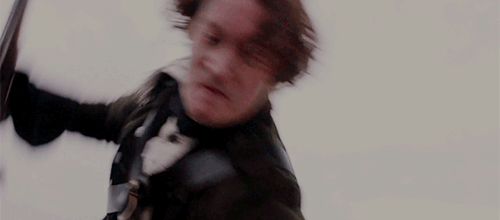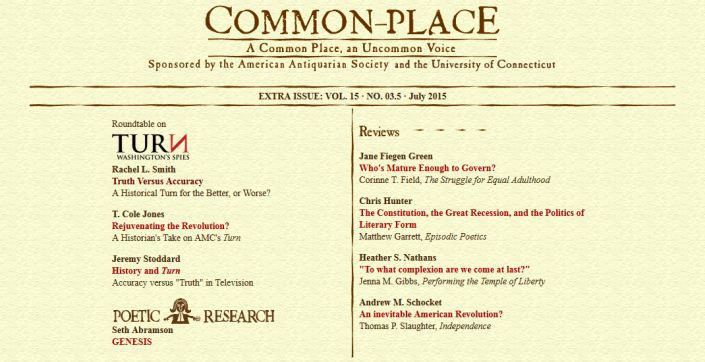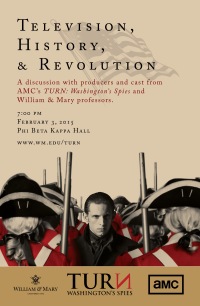cole jones
TURN Season 3: All Quiet on the History Front?
Greetings, TURNcoats! How about a nice link roundup to compliment the first two episodes of Season 3?
Here we are, technically 1/5 of the way into Season 3, and things have been suspiciously quiet over here at the blog. Sure, we’ve had a blast live-tweeting every episode, but no new articles here at the blog. What gives?

Well, to be honest, there hasn’t been a whole lot of actual historical stuff happening in TURN Season 3 thus far. As a historian watching the show, there’s very little fact-based material to capitalize on, aside from a few name drops (e.g. Joseph Reed, Austin Roe) that don’t yet have enough context in the show to merit a full-length analysis. Nearly all of the first two episodes have revolved around made-up love triangles, fictional family feuds, and other interpersonal relationships that never happened.
Thankfully, we have covered most of those subjects in previous posts – so while we wait for some meatier historical topics to arrive in Season 3, here’s a quick and dirty link roundup for those of you trying to sort fact from fiction regarding all the personal drama in the TURNiverse:
- Abe and Anna: Never happened. (Although thus far in Season 3, their fictional affair seems to have cooled considerably.)
- Abe and Robert Rogers: An amusing (if bizarre) premise – but this also never happened. For more about the real Robert Rogers’ wartime escapades, check out Todd Braisted’s excellent summary here.
- Anna and Hewlett: Never happened. Although if you’re interested in the real Hewlett’s role in occupying the town of Setuaket, we’ve got you covered. We featured an article on the historical Hewlett in the middle of Season 2, right before TURN’s Hewlett dramatically veered away from the (until that time) realistic portrayal of his real-life counterpart.
If you’re a little confused from the “authentic” messaging you’ve been hearing from AMC staff regarding Hewlett – no, you’re not crazy! On Twitter and Reddit, Alexander Rose (who joined the show’s writing staff in Season 2) has repeatedly insisted that TURN’s Edmund Hewlett, the royalist commander of Setuaket during the Revolutionary War, has absolutely no connection whatsoever to the historical Richard Hewlett, the royalist commander of Setauket during the Revolutionary War. It is a total and complete coincidence that both men held the exact same station, at the same time and in the same place, and had the last name “Hewlett.”

Needless to say, viewers of the show are right to be a little skeptical. By that logic, of course Anna Strong could never have had an affair with a fictional Redcoat officer! Not to mention, the real Anna Strong was still (by any reasonable account) contentedly married and the mother to several children by the time the summer of 1778 rolled around, so there’s that, too.
- Austin Roe: Okay, Austin Roe DID happen! He was a real person (definitely not anyone’s pseudonym or alias) and, for a time, an absolutely fascinating member of the historical Culper spy ring who served as the vital link communicating intelligence between New York City and Setauket. I’m seriously hoping the one mention he’s had thus far in Season 3 is some kind of bizarre red herring and/or bad history joke – it would truly be a shame for him to be cut out of this series, regardless of how much the show has already careened off the historical record. We will definitely revisit Mr. Roe here on the blog – after we get a better idea of where the show is going to take him.
- Woodhull family drama (especially concerning Mary and Thomas): Never happened. Thankfully,
we’ve got a post on TURN’s convoluted family trees to help viewers sort things out! - Peggy Shippen and Benedict Arnold: Oh yes, this happened – although as many of you likely guessed, it wasn’t exactly the bizarre love triangle with ulterior motives depicted in TURN. We’re in the process of reaching out to a few exciting guest authors for this particular topic, so stay tuned!

- Blood-spattered John Graves Simcoe: Well, it looks like TURN’s “Psycho Simcoe” portrayal isn’t going anywhere this season! Only two episodes into the season and we’ve seen plenty of Simcoe-generated ketchup. If you’re only familiar with Simcoe through what you’ve seen in TURN, you may be in for a bit of a shock once you read a little bit about the real Queen’s Ranger commander by that name! Thankfully, Todd Braisted has not one but two excellent articles about the real Simcoe: one about Simcoe’s captivity at the hands of the Continental Army (as loosely portrayed in Season 1) and another about his tenure as leader of the Queen’s Rangers (TURN Season 2 and beyond). At the TURN roundtable on Common-place.org, guest author and Purdue University history professor T. Cole Jones also analyzes the many liberties TURN takes with John Graves Simcoe.
Well, I think that just about does it for tonight’s link roundup. Plenty of reading to re-visit while we wait for bigger and better spy-related history to materialize in TURN Season 3. Enjoy tonight’s new episode, TURNcoats – and if you’re watching live, don’t forget to join in the fun on Twitter and Facebook!
-RS
New Scholarly Roundtable on Historical Accuracy vs. “Truth” in TURN
Academia finally joins the conversation about TURN! The newest issue of Common-place, an online scholarly journal of Early American life and culture, just launched yesterday — and it features a Roundtable discussion about historical accuracy in TV and film, using TURN: Washington’s Spies as a case study. Don’t let the “scholarly journal” part scare you off — the two main articles in this Roundtable are spirited and highly-readable commentary pieces that are must-reads for any serious fan — or critic — of TURN.

Back in February of this year, we mentioned a most unlikely meeting of the minds at the College of William & Mary, where TURN producers, writers, and cast members gathered onstage alongside William & Mary professors to discuss the role and importance of historical accuracy in film. Happily, footage of the entire 90 minute event was released on Youtube in May, with shorter highlights posted in a William & Mary press release (in case you don’t have an hour and a half to spare).
This new issue of Common-place continues that incredibly important conversation, featuring some names that might be familiar to readers of this blog. To kick things off, I wrote the brief introduction to the Roundtable, framing the debate’s central questions:
- Do the virtues of inaccurate historical films outweigh their vices?
- How much weight should accuracy have in our evaluation of historical film?
- Most importantly, are there historical narrative truths that supersede factual accuracy?
To devoted students of history, that last question might sound silly, if not completely ridiculous — after all, if facts don’t matter, then what does? But it’s a question that more and more people these days — including the writers and producers of TURN — are answering with a resounding “YES.”

Jeremy Stoddard, a professor of education and film studies, gives TV and film writers the benefit of the doubt, arguing that fictional historical narratives DO have value (that is, beyond the monetary sort), referencing his own quest to learn more about Robert Rogers after watching the TURN series premiere. Stoddard, who attended the William & Mary event in person, gives readers a thoroughly detailed summary of the arguments given by TURN’s writers, producers, and other staff (e.g. the costumer) for why they deviated from the historical record in the way that they did. Read Jeremy Stoddard’s Roundtable article here.
On the other end of the debate, T. Cole Jones explains why he finds TURN’s blatant disregard for historical fact extremely problematic. Longtime readers of this blog are already familiar with Dr. Jones, who penned an excellent piece analyzing the treatment of prisoners of war in Season 1 of TURN. In his article for Common-place, Jones targets the show’s portrayal of John Graves Simcoe as a murderous sociopath and cartoonish British villain. He doesn’t mince words, arguing that TURN’s “artistic liberties” are so factually untrue they’d “undoubtedly expose the producers to a defamation of character suit were the people portrayed in the series still alive.” According to Jones, a number of TURN’s factual problems can be traced back to the show’s alleged source material: Alexander Rose’s book Washington’s Spies. It’s a solemn reminder that not all history books are created equal. (We’ll be offering our own concurring opinion on this point sometime later in the TURN offseason.) Read Cole Jones’ Roundtable article here.
Like I said, these pieces are must-reads for any serious fan or critic of TURN — or of historical fiction in general. If you have a Disqus account, you can leave comments on the articles themselves, or join the conversation on Twitter.
Finally: It’s incredibly refreshing to see academics engaging this issue in a scholarly forum — and my thanks to the event organizers at William & Mary for providing an excellent icebreaker back in February. Far too many scholars of Early America have asked the same question voiced by certain TURN fans upon finding this blog: So what? Who cares if some TV show is historically accurate or not? Over the past two years, I’ve been stunned — though not entirely surprised — at how many academics have plugged their ears to the debates taking place over historical accuracy in TURN, often dismissing the subject as insufficiently intellectual or otherwise not worth their attention. They couldn’t be more wrong.
Granted, the primary purpose of TV shows is to entertain, not educate. (And make money doing it.) However, as I argue in the introduction I authored for the Roundtable, the question of accuracy in film does matter because, for better or for worse, historical fiction influences popular historical memory. These TV shows and films are affecting how Americans remember their own history. And for that reason, among others, scholars of Early America ought to weigh in on these debates — which, in many cases, are already happening all around them. As we’re seeing with a number of recent events (e.g. the Confederate Flag brouhaha), the intersection of history and memory impacts an awful lot of people. We do the American public a grave disservice if we let the same people who write questionable “history” books — and the shows and films based on them — be the loudest voices in the conversation.
Check out a 60-second video preview of the new Common-place issue below:
(Note, Jan. 2016: Last year, a few months after the TURN Roundtable was published, Common-place unveiled a brand-new look and a more modern, streamlined format. Eventually, the TURN Roundtable articles will be migrated over to the new journal format, along with the rest of Common-place’s back issues – but until then, they can be found at common-place-archives.org. All the links in this post have been updated to reflect this change. Enjoy!)
-RLS

